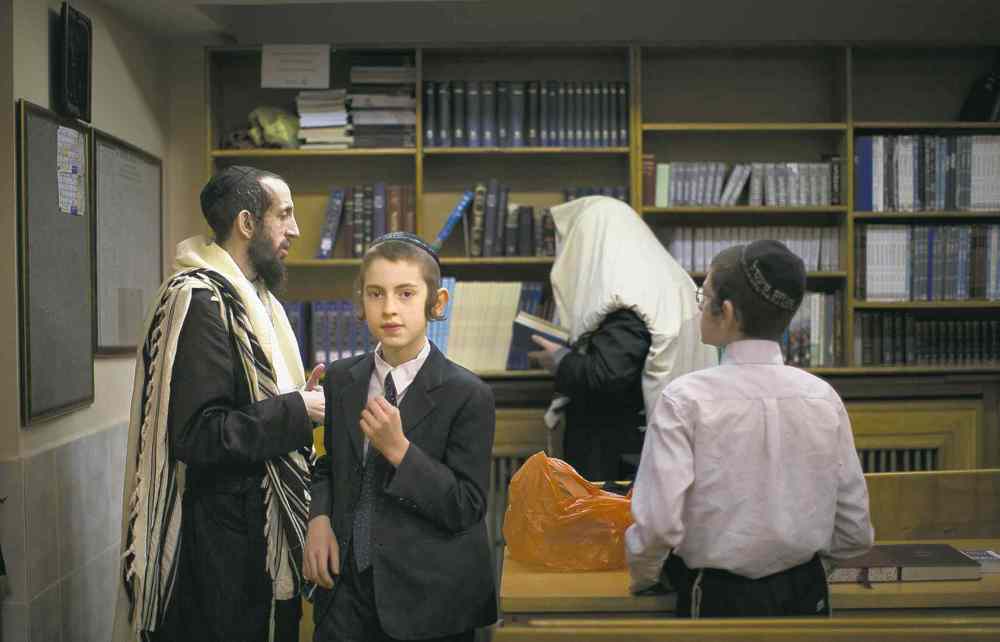Passover provocation
Anti-Semitic flyers in Ukraine a political ploy?
Advertisement
Read this article for free:
or
Already have an account? Log in here »
To continue reading, please subscribe:
Monthly Digital Subscription
$19 $0 for the first 4 weeks*
- Enjoy unlimited reading on winnipegfreepress.com
- Read the E-Edition, our digital replica newspaper
- Access News Break, our award-winning app
- Play interactive puzzles
*No charge for 4 weeks then billed as $19 every four weeks (new subscribers and qualified returning subscribers only). Cancel anytime.
Read unlimited articles for free today:
or
Already have an account? Log in here »
Hey there, time traveller!
This article was published 18/04/2014 (3651 days ago), so information in it may no longer be current.
There’s an old joke about every Jewish holiday boiling down to three basic plot points: A) They tried to kill us; B) We won; and C) Let’s eat.
This is a fallacy, of course. No one gets to eat on Yom Kippur, if you observe the holiday. No one tried to kill anyone in the backstory behind Tu Bishvat, the Israeli version of Arbor Day.
And this notion of Jews always winning? Well, the last 2,000 years of European history might suggest a less victorious outcome.

Passover, however, is one of those Jewish holidays in which the threat-survival-chowdown trinity does, in fact, come into play.
On the first two nights of Passover, Jewish families sit down to a traditional meal called a Seder, where the Exodus story is recounted, a tremendous amount of food is consumed and everyone at the table is supposed to quaff at least four glasses of wine.
That last bit alone ought to make Passover the most popular spring holiday among people of any ethno-religious persuasion, except, of course, the ones in which alcohol consumption is forbidden. But I digress.
As one of the most important holidays on the Jewish calendar, Passover has also served as an excuse to target Jews.
In medieval Europe, anti-Semites scapegoated Jews for murder by spreading malicious stories about the ritual use of blood in the baking of matzo, a flatbread consumed during Passover. This form of persecution became known as the blood libel.
During the Second World War, Nazi forces in Poland invaded the Warsaw Ghetto on the eve of Passover in an effort to quell a Jewish uprising.
And this week, in a dark turn of events in eastern Ukraine, Jews leaving a synagogue in Donetsk were handed leaflets claiming all Jews in the vicinity must register and pay a fine or risk deportation.
The flyers, reportedly handed out by men wearing masks, were clearly meant to evoke measures taken in Nazi Germany during the early days of the Holocaust, when Jews lost property rights and were herded into ghettos.
According to news reports out of Ukraine, whoever created the flyers took pains to make them appear to be the handiwork of the Donetsk People’s Republic, the pro-Russian separatists trying to carve out a piece of eastern Ukraine on Moscow’s behalf.
The separatist group, however, denied any responsibility for the flyers. Analysts also believe pro-Russian forces wouldn’t risk alienating Jews and other ethnic minorities in eastern Ukraine.
“This has nothing to do with us; it is a provocation,” Donetsk People’s Republic spokesman Alexander Maltsev told the New York Times.
So who exactly would perpetrate such a hoax? According to one theory, the flyers were a clumsy effort on the part of pro-Kyiv elements to stir up sentiment against Moscow and ethnic-Russian separatists.
Half a world away, Canadians can take solace no one is actually threatening Ukrainian Jews with deportation
This would be a tit-for-tat move in response to Russian President Vladimir Putin’s assertion the new Ukrainian government in Kyiv includes anti-Semites and ultra-nationalists.
Ukrainian Jews, said the Times, rejected Putin’s claims. Nonetheless, given the high volume of propaganda flying around eastern Europe right now, it’s conceivable someone would try to discredit Russia in retaliation.
Before Ukraine achieved independence in 1991, Jews in that country experienced 170 years of persecution under tsarist rule, Nazi occupation and Soviet administration. Since 1991, anti-Semitism has waned in Ukraine, even as the Jewish population dwindled to about 250,000, mainly because of emigration.
Now, the register-or-leave hoax is stirring up painful memories of tsarist pogroms, Nazi death camps and Soviet cultural suppression.
Pro-Kyiv and pro-Moscow forces appear to be playing a dangerous game of Who’s The Bigger Hatemonger? without giving any thought to end result of the propaganda.
“We have seen a series of cynical and politically manipulative uses and accusations of anti-Semitism in Ukraine over the past year,” Abraham H. Foxman, the Soviet-born, U.S.-based director of the Anti-Defamation League, said in a statement this week.
“The perpetrators and their targets are opposing politicians and political movements, but the true victims are the Jewish communities. We strongly condemn the anti-Semitic content, but also all attempts to use anti-Semitism for political purposes.”
Half a world away, Canadians can take solace no one is actually threatening Ukrainian Jews with deportation. But we can also see the danger in throwing around accusations of anti-Semitism in an irresponsible way, playing on ancient Jewish memories of persecution.
bartley.kives@freepress.mb.ca


